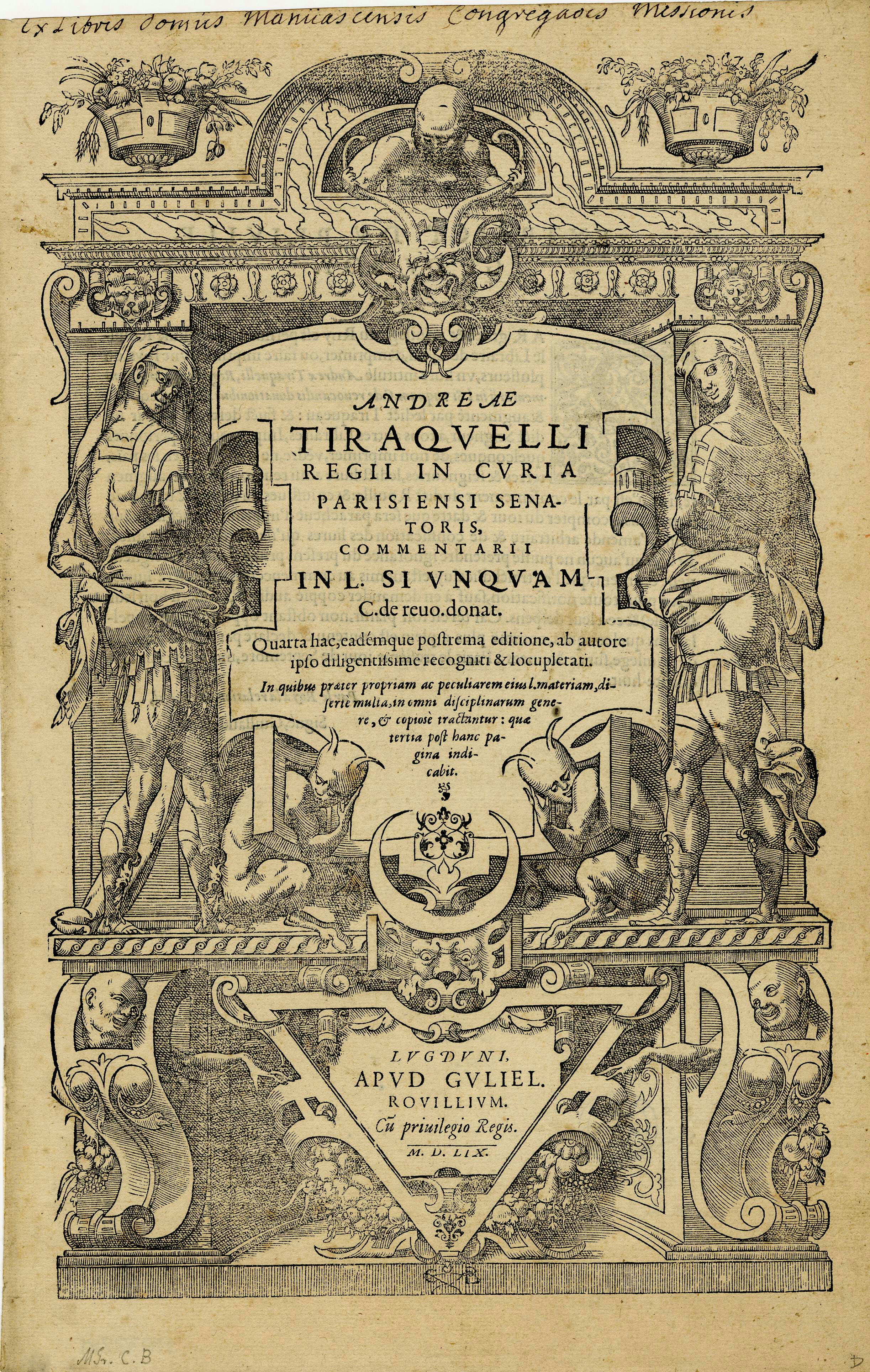André Tiraqueau on:
[Wikipedia]
[Google]
[Amazon]
André Tiraqueau ( la, Andreas Tiraquellus) (1488–1558) was a French jurist and politician. He is known also as a patron of
Google Books

 *''De nobilitate et jure primigeniorum'' (1549). This work addressed the topic of nobility as social status and recognition, picking up from Bartolus who wrote a work with the same title. Tiraqueau's theory followed that of Bartolus, on the political and legal origins of nobility, as opposed to kinship; and integrated it with the French situation and the ''
*''De nobilitate et jure primigeniorum'' (1549). This work addressed the topic of nobility as social status and recognition, picking up from Bartolus who wrote a work with the same title. Tiraqueau's theory followed that of Bartolus, on the political and legal origins of nobility, as opposed to kinship; and integrated it with the French situation and the ''
Google Books
WorldCat pageOpen Library page
{{DEFAULTSORT:Tiraqueau, Andre 1488 births 1558 deaths 16th-century French lawyers French Renaissance humanists French male non-fiction writers
François Rabelais
François Rabelais ( , , ; born between 1483 and 1494; died 1553) was a French Renaissance writer, physician, Renaissance humanist, monk and Greek scholar. He is primarily known as a writer of satire, of the grotesque, and of bawdy jokes and ...
, and the character Trinquamelle in '' Gargantua and Pantagruel'' is traditionally identified with Tiraqueau.Edwin M. Duval, ''The Design of Rabelais's Tiers livre de Pantagruel'', p. 136Google Books

Life
He was a legal humanist based in Fontenay-le-Comte, Poitou, where he knew Amaury Bouchard. He married Marie Cailler, daughter of Artus Caillier, a legal officer at Fontenay; the marriage took place in 1512, when she was still very young, and he proceeded with two works on the ''Querelle des femmes
"The woman question", which is translated from the French term ''querelle des femmes'' (literally, "dispute of women"), refers both in historiography to an intellectual debate from the 1400s to the 1700s on the nature of women and feminist campai ...
'' and married life.
Tiraqueau held the local legal offices of ''juge-châtelain'' and ''lieutenant''. He was appointed a counsellor of the Parlement of Paris in 1531.
Pierre Bayle included a chapter on "Books and Children" in his ''Historical and Critical Dictionary'' calling into question a claim that Tiraqueau fathered 45 children and wrote as many books, creating one of each per year.
Works
Tiraqueau had a reputation as a prolific writer. *''De legibus connubialibus'' (1513). This work justifies the legal disabilities of women by appeal to ''jus gentium
The '' ius gentium'' or ''jus gentium'' (Latin for "law of nations") is a concept of international law within the ancient Roman legal system and Western law traditions based on or influenced by it. The ''ius gentium'' is not a body of statute law ...
'' and divine law. It began as part of a commentary on the customs of Poitou, and grew through numerous editions.
 *''De nobilitate et jure primigeniorum'' (1549). This work addressed the topic of nobility as social status and recognition, picking up from Bartolus who wrote a work with the same title. Tiraqueau's theory followed that of Bartolus, on the political and legal origins of nobility, as opposed to kinship; and integrated it with the French situation and the ''
*''De nobilitate et jure primigeniorum'' (1549). This work addressed the topic of nobility as social status and recognition, picking up from Bartolus who wrote a work with the same title. Tiraqueau's theory followed that of Bartolus, on the political and legal origins of nobility, as opposed to kinship; and integrated it with the French situation and the ''scientia juris
Scientia is the Latin word for knowledge. It may refer to:
* 7756 Scientia
*'' The Triumph of Science over Death'', a sculpture of Filipino hero José Rizal
José Protasio Rizal Mercado y Alonso Realonda (, ; June 19, 1861 – December ...
''. The theory was undermined in the longer term by the French kings' use of venal office.
He wrote a commentary on the ''Geniales dies'' of Alessandro Alessandri
Alessandro Alessandri also known as Alexander ab Alexandro (1461–1523) was a Neapolitan lawyer of great learning, who flourished towards the end of the fifteenth and beginning of the sixteenth century, was descended of the ancient and noble fam ...
.
Tiraqueau's works were collected, firstly in five volumes (1574), and then in seven (Frankfurt, from 1597). The arrangement in the seven-volume edition is:
*I: On nobility and primogeniture
Primogeniture ( ) is the right, by law or custom, of the firstborn legitimate child to inherit the parent's entire or main estate in preference to shared inheritance among all or some children, any illegitimate child or any collateral relativ ...
;
*II: legal rights in marriage;
*III: law of repossession;
*IV: ''Cessante causa'';
*V: Legacies for pious use, and other works;
*VI: Commentary on ''Si unquam'';
*VII: moderation of punishments.
Friendship with Rabelais
Rabelais met Tiraqueau during his time as an Observantine Franciscan at Fontenay; he participated in the humanist circle there, in the early 1520s. Tiraqueau was the dedicatee of an edition by Rabelais of the letters of Giovanni Manardi. As Rabelais was writing his ''Tiers Livre'', Tiraqueau was collecting authorities for his work on nobility (1549). It has been suggested that Rabelais took largely from Tiraqueau's references. Tiraqueau apparently cooled towards Rabelais in later life, and played down his public disagreement with Amaury Bouchard over women (of which Rabelais made much literary use).Plattard, p. 249Google Books
Notes
References
*Jean Plattard (1968), ''The Life of François Rabelais'' *M. A. Screech
Michael Andrew Screech, FBA (2 May 1926 – 1 June 2018) was a cleric and a professor of French literature with special interests in the Renaissance, Montaigne and Rabelais.
__NOTOC__ Wartime service
In 1943 Screech entered University College Lo ...
(1979), ''Rabelais''
External links
WorldCat page
{{DEFAULTSORT:Tiraqueau, Andre 1488 births 1558 deaths 16th-century French lawyers French Renaissance humanists French male non-fiction writers